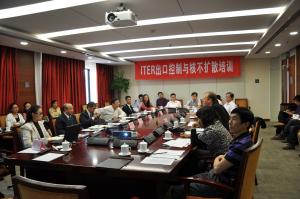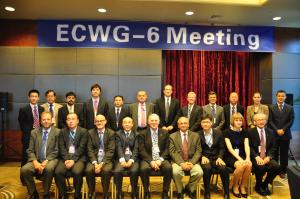Training days at the Chinese Domestic Agency
14 Oct 2011
The third meeting of the Intellectual Property Contact Persons. the meeting was chaired by Akko Maas, responsible for ITER Organization-Domestic Agency coordination (centre right).
Late September, the Chinese Domestic Agency hosted a week of meetings on the important topics of intellectual property management, and export control and non-proliferation. The acceleration of construction and manufacturing activities for ITER makes common policy on these particular issues important for the ITER Organization and the ITER Members.
The third meeting of the Intellectual Property Contact Persons (IPCP) was held 20-21 September in Shenzhen, China, to discuss the progress accomplished in improving the management of intellectual-property-related matters within the ITER Organization and at the Domestic Agencies over the past year. Chaired by Akko Maas, responsible for ITER Organization-Domestic Agency coordination, the meeting was the occasion to report on major milestones, such as the establishment of the Intellectual Property Management Board at ITER, the intellectual property database now in production, and recently established reporting tools and procedures at both the ITER Organization and the Domestic Agencies. Staff awareness training continues on intellectual property issues; by the end of the two-day meeting, there was common agreement that the handling of publications, copyright and the protection of patentable information might be improved through tighter collaboration.
The working group on Export Control, Peaceful Uses and Non-Proliferation (ECWG) in its sixth meeting.
The working group on Export Control, Peaceful Uses and Non-Proliferation (ECWG) met for the sixth time on 22-23 September, also in Shenzhen, under the chairmanship of Michael Roberts. Participants reviewed the lists of ITER components and equipment potentially subject to export control and the procedure to update these lists. Compliance programs as well as document and security handling procedures were discussed in great detail. The working group also collaborated with the Test Blanket Module Program Committee (TBM-PC) chair on export control considerations for the TBM program.
Export control awareness training has now been dispensed to most staff at the ITER Organization, and training programs have been organized at some of the Domestic Agencies. In the days preceding the ECWG meeting, a two-day training program was held by the Chinese Domestic Agency (CN-DA). Akko Maas presented the overall management strategies on export control and non-proliferation issues for ITER and the ECWG contact person for China presented the domestic perspective on these issues. Obstacle-free import and export of ITER-related materials and components was the goal of the discussions that followed.
In the months to come, the ECWG will work toward to establish an understanding of the different security classification systems that are used by the ITER Organization and the Member countries.
Export control awareness training has now been dispensed to most staff at the ITER Organization, and training programs have been organized at some of the Domestic Agencies. In the days preceding the ECWG meeting, a two-day training program was held by the Chinese Domestic Agency (CN-DA). Akko Maas presented the overall management strategies on export control and non-proliferation issues for ITER and the ECWG contact person for China presented the domestic perspective on these issues. Obstacle-free import and export of ITER-related materials and components was the goal of the discussions that followed.



